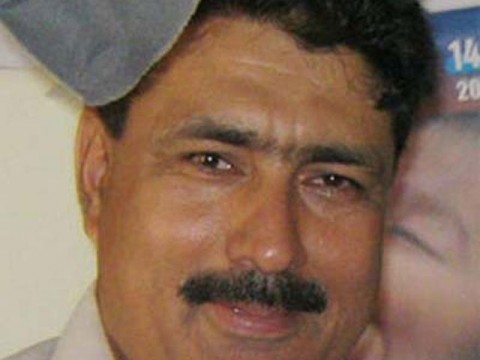Archives
AND MORE...

Loose Lips & Big Mouths
_____________________

VP Foot-In-Mouth
_____________________

"I Have Israel's Back"
_____________________

BOMBSHELL: The Brits Did It
____________________
May 23, 2012
Running-Mouth Syndrome
With all the self-praise the Obama administration is heaping upon itself (ad nauseum, in fact) we’re hearing very little about the Pakistani doctor who helped the U.S. track down Usama bin Laden and who has just been sentenced to 33 years in a Pakistani prison, with hard labor (see below).
GOP Rep. Peter King, chairman of the Homeland Security Committee, said he is focused on why the Obama administration didn't do more to protect the doctor. "I'm focused on that they disclosed his identity," said King.
We know the Obama administration has a tendency to betray allies (e.g., see here, here and here), but why betray someone who helped us find a longtime enemy?!
It’s called Running-Mouth Syndrome, and it's a variant of Foot & Mouth disease.
FoxNews.com | May 23, 2012
Pakistani Doctor Who Helped US In Bin Laden Raid Sentenced To Prison

PESHAWAR, Pakistan – A Pakistani doctor who helped the U.S. track down Usama bin Laden was sentenced to 33 years in prison on Wednesday for conspiring against the state, officials said, a verdict that is likely to further strain the country's relationship with Washington.
Shakil Afridi ran a vaccination program for the CIA to collect DNA and verify bin Laden's presence at the compound in the town of Abbottabad where U.S. commandos killed the Al Qaeda chief last May in a unilateral raid. The operation outraged Pakistani officials, who portrayed it as an act of treachery by a supposed ally.
Senior U.S. officials have called for Afridi to be released, saying his work served Pakistani and American interests. But many Pakistani officials, especially those working for the country's powerful spy agency, do not see it that way.
"He was working for a foreign spy agency. We are looking after our national interests," said a Pakistani intelligence official, speaking on condition of anonymity in line with the agency's policy.
GOP Rep. Peter King, chairman of the Homeland Security Committee, said Wednesday he is focused on why the Obama administration didn't do more to protect the doctor.
"This has been handled very poorly right from the time of the raid," King told Fox News.
King, R-N.Y., said administration officials talking about the doctor and his DNA samples from the start.
"They put him out there," said King, who made clear he didn't know the exactly details about what if anything did the administration do to get the doctor out of Pakistan.
I'm focused on that they disclosed his identity," he said.
Afridi's conviction comes at a sensitive time because the U.S. is already frustrated by Pakistan's refusal to reopen NATO supply routes to Afghanistan. The supply routes were closed six months ago in retaliation for American air strikes that killed 24 Pakistani soldiers.
Afridi was detained sometime after the May 2, 2011, raid, but the start of his trial was never publicized.
He was tried under the Frontier Crimes Regulations, or FCR, the set of laws that govern Pakistan's semiautonomous tribal region. Human rights organizations have criticized the FCR for not providing suspects due process of law. There is no right to legal representation, to present material evidence or cross-examine witnesses.
The verdict was handed down by a Khyber government official in consultation with a council of elders, according to Nasir Khan, a government official in the Khyber tribal area, where the doctor was arrested and tried.
A senior U.S. official with knowledge of counter-terrorism operations against al-Qaeda in Pakistan said the doctor was never asked to spy on Pakistan.
"He was asked only to help locate al Qaeda terrorists, who threaten Pakistan and the U.S." he told Fox News. "He helped save Pakistani and American lives. His activities were not treasonous, they were heroic and patriotic. "
As well as the prison term, Afridi was ordered to pay a fine of about $3,500 and will spend an additional three and half years in prison if he does not, Khan said.
Afridi can appeal the verdict to the FCR commissioner within a period of two months, said Iqbal Khan, another Khyber government official.
The U.S. operation that killed bin Laden severely strained ties with Pakistan. The Pakistani government kicked out U.S. military trainers and limited counter terrorism cooperation with the CIA.
The relationship got even worse in November when the U.S. killed the 24 Pakistani soldiers at two posts along the Afghan border, an attack that Washington said was an accident but the Pakistani army insisted was deliberate.
Pakistan immediately retaliated by closing the NATO supply routes and kicking the U.S. out of a base used by American drones. Before the attack, the U.S. and other NATO countries fighting in Afghanistan shipped about 30 percent of their nonlethal supplies through Pakistan. Since then, the coalition has used far more expensive routes through Russia and Central Asia.
The U.S. has pressed Pakistan to reopen the supply line, but negotiations have been hampered by... more here
Log In »
Notable Quotables
"Mr. Netanyahu is one of the most media-savvy politicians on the planet. On Friday he appeared live via video link on 'Real Time with Bill Maher,' taking the host’s alternately sardonic and serious line of questioning with gazelle-like alacrity."
~ Anthony Grant, jourrnalist who has written for many major newspapers and worked in television at Paris and Tel Aviv, interviewing former PM Benjamin Netanyahu on Monday, at the outset of Mr. Netanyahu's new book (more here).
And Then Some
Dangling Israel
March 24, 2022
New Global Leaders
March 23, 2022
Ukraine Can Learn From Israel
January 31, 2022



